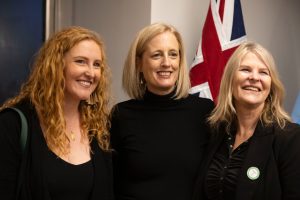United Nations Commission on the Status of Women
Julianna Marshall, Policy and Education Manager, Central Australian Women’s Legal Service
June 2024
In March 2024, Julianna Marshall, Policy and Education Manager at the Central Australian Women’s Legal Services joined approximately 60 other Australians forming the civil society delegation to the 68th Session of the United Nations Commission on the Status of Women.
Representing Community Legal Centres Australia, Julianna attended a broad range of official events, side events and parallel events over a ten-day period which each focused on the priority theme ‘Accelerating the achievement of gender equality and the empowerment of all women and girls by addressing poverty and strengthening institutions and financing with a gender perspective’.
In addition to observing the meeting proceedings, Julianna attended the following events and meetings:
- Official welcome reception for Australian delegates hosted by Senator the Hon Katy Gallagher and Mr James Larsen, Ambassador and Permanent Representative to the UN, at the Permanent Mission of Australia to the UN
- Opening address: UN Secretary-General António Guterres’ remarks to the Commission on the Status of Women
- Language training: Agreed Conclusions delivered by Equality Rights Alliance
- Shattered hopes: A multi-country perspective on drivers of poverty of migrant women, (Australia, Canada, Columbia, New Zealand)
- The CEDAW challenge for future generations: Why innovation matters, Cities for CEDAW and County of Los Angeles
- The necessity of a binding Optional Protocol to CEDAW to end violence against women and girls, organized by Every Woman Treaty and co-hosted by World Council of Churches
- Feminist approaches to justice: Gendered costs of criminal legal systems, sponsored by the World Society of Victimology
- BayKin2 – A UN-funded sexual and reproductive health gaming app for adolescents
- Informal meetings with other NGO delegates
Julianna shared the following reflections:
The experience offered a valuable opportunity to network and consolidate relationships with the official delegates, other Australian NGO representatives as well as international colleagues. The importance of concerted and collective advocacy to advance the rights of women and girls in all their diversity was apparent and was reflected in the thoughtful and considered feedback that the Australian NGO delegation provided to the official delegates on the numerous working drafts of the Agreed Conclusions.

It was rewarding to see the drafts progressively reflect a more nuanced understanding of the relationship between poverty and gendered violence against women over the course of the negotiations, with the Agreed Conclusions ultimately appearing to reflect an understanding of the concept of social entrapment as it relates to violence against women and girls. Further, the final form of the Agreed Conclusions specifically expressed deep concern about the relationship between lack of access to justice and effective legal remedies with vulnerability to gendered violence. However, it was equally clear that there were forces at play at the Commission that sought to limit the progress of women’s rights and that negotiations around language were long and drawn out.
There was a brewing sense of urgency amongst NGO representatives to consolidate and protect the role of civil society in the CSW process, particularly from those participating in parallel events organised by the NGO CSW. Alongside calls for a revitalization of the Commission on the Status of Women and greater commitment to clear action-oriented outcomes anchored to the Beijing Platform for Action, there was concern that many members were not simultaneously represented by civil society and able to present their statements without commentary or challenge from domestic NGOs. Further, the relationship between the different UN mechanisms was a cause for concern with limited engagement between the CSW and the CEDAW Committee or the Special Rapporteur on Violence Against Women. There was also growing shared vision amongst many NGO representatives from around the globe of the need to enhance the international human rights law framework in terms of its response to violence against women and girls by establishing a new Optional Protocol under CEDAW to specifically address violence against women and girls.
Highlights included informal discussion with former UN Special Rapporteur and CEDAW Chairperson, Dubravka Simonovic, the opportunity to meet incredible Australian women from across the country, and the very warm reception I received from UN security when I had to unexpectedly bring my two-year-old son into the UN building for an event.